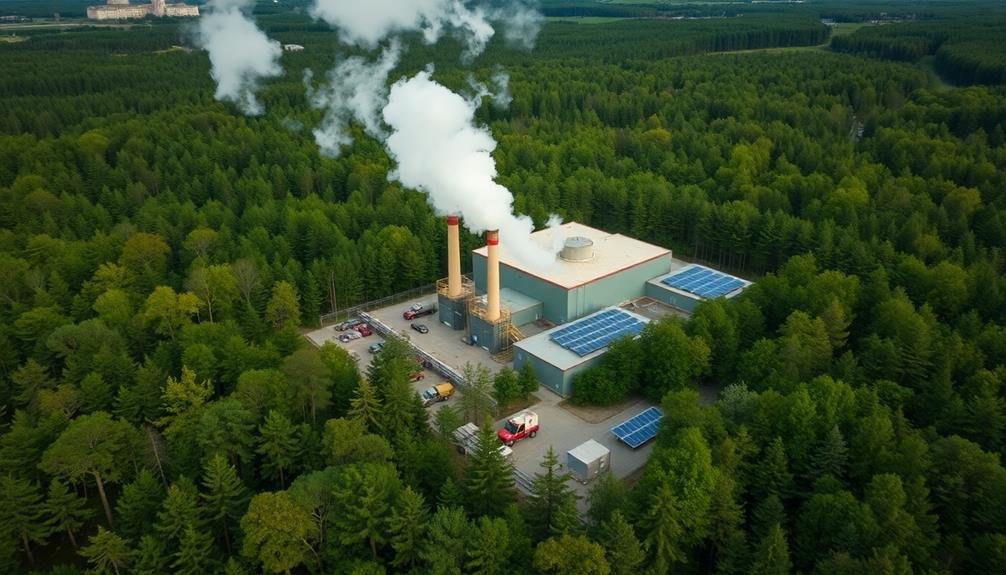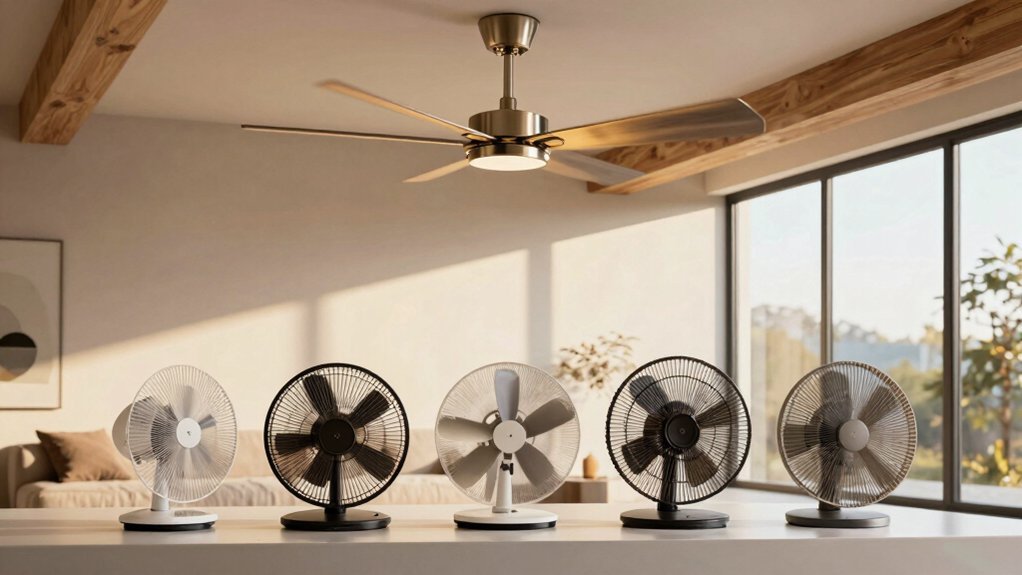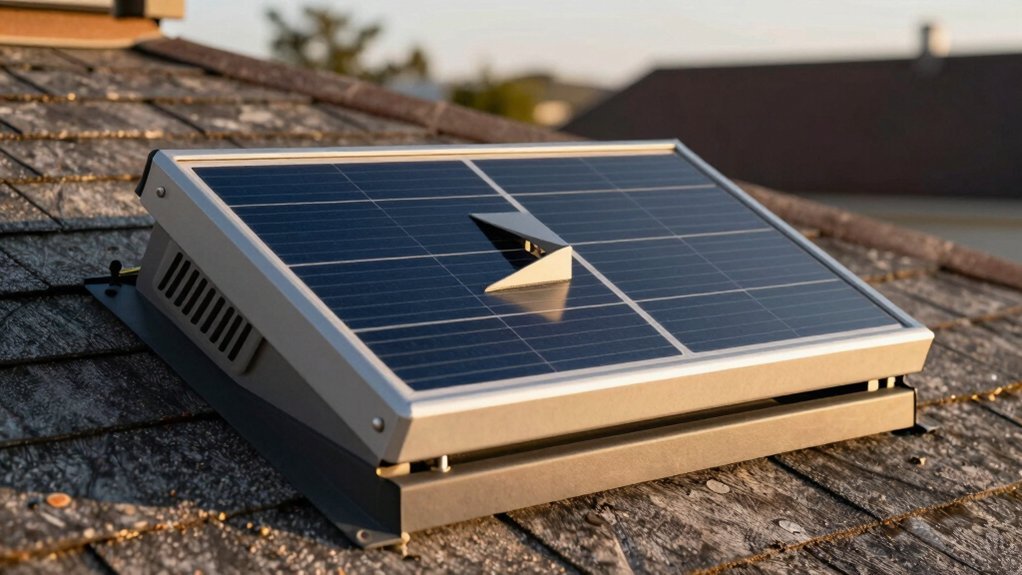You'll find the most thorough and effective biomass heating regulations in Vermont, Oregon, and New Hampshire. Vermont leads with strong renewable energy commitments, offering grants, loans, and tax exemptions for biomass projects. Oregon provides extensive incentives, including tax credits and cash rewards for qualifying installations. New Hampshire focuses on stringent emission standards, ensuring clean air through high-efficiency systems and thorough review processes. Each state uniquely promotes sustainable energy use, balancing environmental concerns with economic incentives. By exploring these regulations, you'll discover how they're shaping the future of renewable heating and potentially benefit from their forward-thinking policies.
Vermont's Progressive Biomass Policies

When it comes to biomass heating regulations, Vermont stands out as a leader. The state's commitment to renewable energy has led to progressive policies that encourage the use of biomass heating systems. You'll find that Vermont offers numerous incentives for both residential and commercial biomass installations.
Vermont's Clean Energy Development Fund provides grants and low-interest loans for biomass projects. You can take advantage of these programs to offset the initial costs of installing a biomass heating system. The state also offers sales tax exemptions on biomass equipment, further reducing your expenses.
Vermont's regulations guarantee that biomass heating systems meet strict emissions standards. You'll need to comply with particulate matter limits and efficiency requirements, which help maintain air quality and maximize energy use.
The state's Residential Building Energy Standards mandate minimum efficiency levels for new biomass installations, assuring you're using the most effective technology available.
You'll also benefit from Vermont's Renewable Energy Standard, which requires utilities to source a percentage of their electricity from renewable sources, including biomass. This policy creates a market for biomass-generated electricity, potentially lowering your heating costs in the long run.
Oregon's Sustainable Heating Incentives
Oregon's approach to sustainable heating incentives reflects the state's commitment to renewable energy and environmental stewardship.
You'll find that Oregon offers a range of programs to encourage the use of biomass heating systems. The state's Residential Energy Tax Credit (RETC) program provides homeowners with tax credits for installing qualifying biomass heating systems, making it more affordable to switch to renewable energy sources.
You can also take advantage of the Energy Trust of Oregon's cash incentives for biomass boilers and furnaces. These incentives can greatly reduce your upfront costs when installing a new system.
Oregon's Department of Energy offers low-interest loans through its Small Scale Energy Loan Program (SELP), helping you finance biomass heating projects.
The state's Building Codes Division has implemented strict efficiency standards for biomass heating systems, ensuring that you're investing in high-quality, environmentally friendly equipment.
Oregon's Clean Fuels Program incentivizes the production and use of low-carbon fuels, including biomass-derived fuels, further supporting the state's sustainable heating goals.
New Hampshire's Emission Standards

New Hampshire's emission standards for biomass heating systems are among the most stringent in the United States. If you're considering installing a biomass heating system in the Granite State, you'll need to familiarize yourself with these regulations.
The state's Department of Environmental Services (DES) has implemented strict guidelines to guarantee clean air and minimize pollution from biomass combustion.
To comply with New Hampshire's emission standards, you'll need to:
- Choose a high-efficiency biomass boiler or furnace that meets the state's particulate matter emission limits
- Install proper emission control devices, such as electrostatic precipitators or baghouse filters
- Conduct regular maintenance and tune-ups to maintain ideal system performance
- Keep detailed records of fuel usage, emissions testing, and maintenance activities
You'll also need to obtain the necessary permits before installing your biomass heating system.
The DES requires all new installations to undergo a thorough review process to guarantee compliance with emission standards.
Frequently Asked Questions
How Does Biomass Heating Compare to Traditional Fossil Fuel Heating Systems?
You'll find biomass heating generally more eco-friendly than fossil fuel systems. It's renewable and can be cheaper long-term. However, it may require more space and maintenance. Efficiency varies, but modern biomass systems can rival traditional heating methods.
What Are the Potential Drawbacks or Environmental Concerns of Biomass Heating?
You'll find that biomass heating can lead to deforestation, air pollution from particulate matter, and carbon emissions. It's not always carbon-neutral, and it may compete with food production for land use. Proper regulation is essential.
Are There Federal Incentives Available for Biomass Heating Installations?
Yes, you'll find federal incentives for biomass heating installations. You can take advantage of tax credits, grants, and rebates through programs like the Renewable Energy Investment Tax Credit and the USDA's Rural Energy for America Program.
How Does Biomass Heating Affect Indoor Air Quality in Residential Settings?
You'll find that biomass heating can impact your indoor air quality. It may release particulate matter and gases. To maintain good air quality, you'll need proper ventilation and regular maintenance of your biomass heating system.
What Types of Biomass Fuels Are Most Commonly Used in Heating Systems?
You'll commonly find wood pellets, wood chips, and cordwood used in biomass heating systems. Crop residues like corn stalks or straw are also options. Some systems can even use specially processed municipal solid waste as fuel.
In Summary
You've now seen three of the best state biomass heating regulations in the US. Vermont's progressive policies, Oregon's sustainable incentives, and New Hampshire's emission standards set the bar high. As you consider biomass heating options, keep these examples in mind. They'll help you navigate the regulatory landscape and make informed decisions. Remember, these states are leading the way in balancing environmental concerns with heating needs. Stay informed and you'll be well-equipped to make the best choices for your home or business.





Leave a Reply